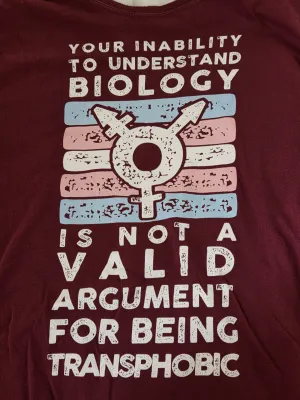Opinion
October 6, 2025
We Must Stand with Our Trans Neighbors
by
Bruce Mirken
Most of us have some hobby or favorite activity we do to keep ourselves sane amid the pressures of daily living and the increasing political madness that is the USA. For me, it’s performing in community theater, and that’s where I met Perry (a pseudonym). At 17, Perry was the youngest transgender person I’d ever known.
We were both in the summer 2022 Shakespeare-in-the-Park production of “The Tempest” here in Hilo. I played one of the sketchier characters – Alonso, the King of Naples – and Perry was a young soldier who acted as my bodyguard. It took me a while to be sure he was trans, since it seemed intrusive to come right out and ask someone I’d just met, simply based on their appearance, but as we got to know each other, I learned more about his story.

I liked Perry instantly. He just was, and is, a thoroughly nice kid (though at age 20 he’d probably object to my calling him a kid now, even though I’m old enough to be his grandfather), the sort of person you’d want to have as a friend. Like a lot of trans youth, his childhood felt unsettled. “I always felt uncomfortable,” he told me. “I rebelled against every single authority most of my childhood.” His feelings began to crystallize when he was about twelve. “I always felt like I wasn’t myself, like I was playing a role.”
As a child, he didn’t have a vocabulary to explain his feelings, but as he got a bit older and read more, he learned what it meant to be transgender, and instantly everything clicked. Being able to live as the boy he always felt he was, he said, meant “I don’t have to be uncomfortable my whole life.”
It wasn’t always easy. Perry’s mom in particular was distressed at first. So, a while after he had begun living as a boy, he took a stab at trying to please her by reverting to his former identity and adopting typically female dress and appearance. He was miserable. The experiment lasted less than a week.
Perry knows who he is, and he doesn’t need politicians telling him how to live his life or what sort of health care he should have, but that’s precisely what the Trump administration wants to do to every trans person. Though Perry lives in Hawaii, where both state laws and public attitudes are generally supportive (thanks in part to a long tradition of acceptance of gender variance among Native Hawaiians and other Pacific Island peoples), he could still be impacted by the administration’s war on trans people. And make no mistake, it is a war, even if it doesn’t (yet) involve bullets.
It began on Trump’s first day in office, with a genuinely demented executive order titled “Defending Women from Gender Ideology Extremism and Restoring Biological Truth to the Federal Government.”
Lest you think I exaggerate by calling it demented, here’s how the “Purpose” section of the order starts things off: “Across the country, ideologues who deny the biological reality of sex have increasingly used legal and other socially coercive means to permit men to self-identify as women and gain access to intimate single-sex spaces and activities designed for women, from women’s domestic abuse shelters to women’s workplace showers. This is wrong. Efforts to eradicate the biological reality of sex fundamentally attack women by depriving them of their dignity, safety, and well-being.”
Like virtually everything on transgender issues from the administration, the order fails to even acknowledge the existence of transgender men like Perry. It also ignores the fact that the people who have studied sex and gender think that the assertions in the order are nonsensical. The American Psychological Association, for example, explains that “gender refers to the socially constructed roles, behaviors, activities, and attributes that a given society considers appropriate for boys and men or girls and women” (emphasis added). Simply put, the anatomy you’re born with is not the same thing as your gender. Kellan E. Baker, executive director of the Institute for Health Research & Policy at health services network Whitman-Walker, told ABC News that Trump’s order was “shockingly out of step with what we know from science.”
Gender-affirming care, delivered appropriately, receives overwhelming support from medical, psychiatric, psychological and nursing societies and professional organizations, who emphasize that it can be life-saving at times. But we’ve learned since January that this administration has little regard for science on a variety of issues, from vaccines to climate change.
On the heels of Trump’s order, the administration began defunding research of all sorts related not only to transgender issues but also studies addressing gender more broadly. Many of the researchers, including Dr. Brittany Charlton, got letters telling them their work was “antithetical to scientific inquiry.” Charlton, an epidemiologist, associate professor and founding director of the LGBTQ Health Center of Excellence based at Harvard Pilgrim Health Care Institute in partnership with Harvard T.H. Chan School of Public Health, promptly sued, explaining in a ferocious op-ed for The Hill, “I’m not promoting radical ideology, woke ideology, gender ideology or any kind of ideology at all. I’m a scientist. I work to keep people healthy.”
Whether politicians like it or not, a person’s gender and gender identity impact their health and how they interact with the health care system. That’s not hard to understand – if you want to understand, that is.
Some of those early administration attacks on gender identity were startlingly petty, as when Environmental Protection Agency employees suddenly found that their pronouns had been removed from their email signatures without their knowledge or permission. Others, like moves to restrict how people could identify their gender on their passports, were much more serious.
Since then, things have only gotten more sinister, with the administration pressuring hospitals – sometimes successfully – to deny gender-affirming care to young people who need it. And over the summer, the Federal Trade Commission “launched a public inquiry to better understand how consumers may have been exposed to false or unsupported claims about ‘gender-affirming care,’ especially as it relates to minors, and to gauge the harms consumers may be experiencing.” The sneer quotes around “gender-affirming care” would seem to indicate that the commission has already made up its mind.
I don’t know what medical care Perry has gotten, either before or after he became a legal adult. It’s none of my business. But I do know that decisions about that care belong in the hands of him, his healthcare providers and his family, not politicians pursuing an ideological crusade to erase his existence.
Federal and state efforts to restrict or ban gender-affirming care are already having a dangerous and potentially devastating impact, as a recent article in MedPage Today explained. One doctor who treats trans patients told the medical news site, "There's been a dramatic increase in patients I've seen who are experiencing suicidality or engaging in self-harm behaviors," even if their own care isn't currently threatened. "These conversations have an impact now. People are feeling it."
There may be more attacks coming. In recent weeks, we have seen increasing signs that the administration and some of its supporters are trying to tie support for transgender rights to terrorism. While the fact-checking site Snopes.com reminds us that much of the information thus far comes from anonymous sources and that some accounts have oversimplified what those sources said, there seems to be little doubt that the push to demonize trans people as predatory and violent is real and accelerating. This community faces serious, possibly deadly, threats.
Make no mistake: The only “radical gender ideology” is the one that claims that trans people aren’t real and that they don’t have the same right to live their lives – and get appropriate medical care – as anyone else. Defend Public Health’s mission statement declares, “We believe that everyone has the right to what they need for a healthy life, regardless of race, ethnicity, religion, disability, sexual orientation, gender or gender identity.” That emphatically includes gender-affirming care for those who need it.
Our neighbors, including my friend Perry, are under attack. We have a duty to defend them with every tool we have.
Bruce Mirken is a longtime writer and advocate and serves as Communications Co-Chair of Defend Public Health.


